IDI Convenes First-Time Voters for Pre-Election Conference
IDI and the Yigal Allon Center held a special election conference for over 1,200 students from pre-army gap year programs. The conference provided an opportunity for leaders from across the political spectrum to address the issues young Israelis say are most important to them including the high cost of living and matters of religion and state.
IDI and the Yigal Allon Center held a special pre-election conference for over 1,200 students from pre-army gap year programs across Israel. The conference provided an opportunity for leaders from across the political spectrum to address the issues most important to young Israelis, such as the high cost of living and matters of religion and state, as well as the ongoing constitutional and political crisis.
The students were able to interact with some of the leading candidates in the Knesset election, including former IDF Chief of Staff Gadi Eisenkot (National Unity), MK Rabbi Gilad Kariv (Labor), MK Yoav Gallant (Likud), Zehava Galon (Meretz), Minister of the Interior Ayelet Shaked (Jewish Home), and Minister of the Economy Orna Barbivai (Yesh Atid).
data-link="https://photos.app.goo.gl/ffrQX14KvSCCpz6B8"
data-title="IDI Convenes First-Time Voters for Pre-Election Conference"
data-description="13 new items added to shared album">
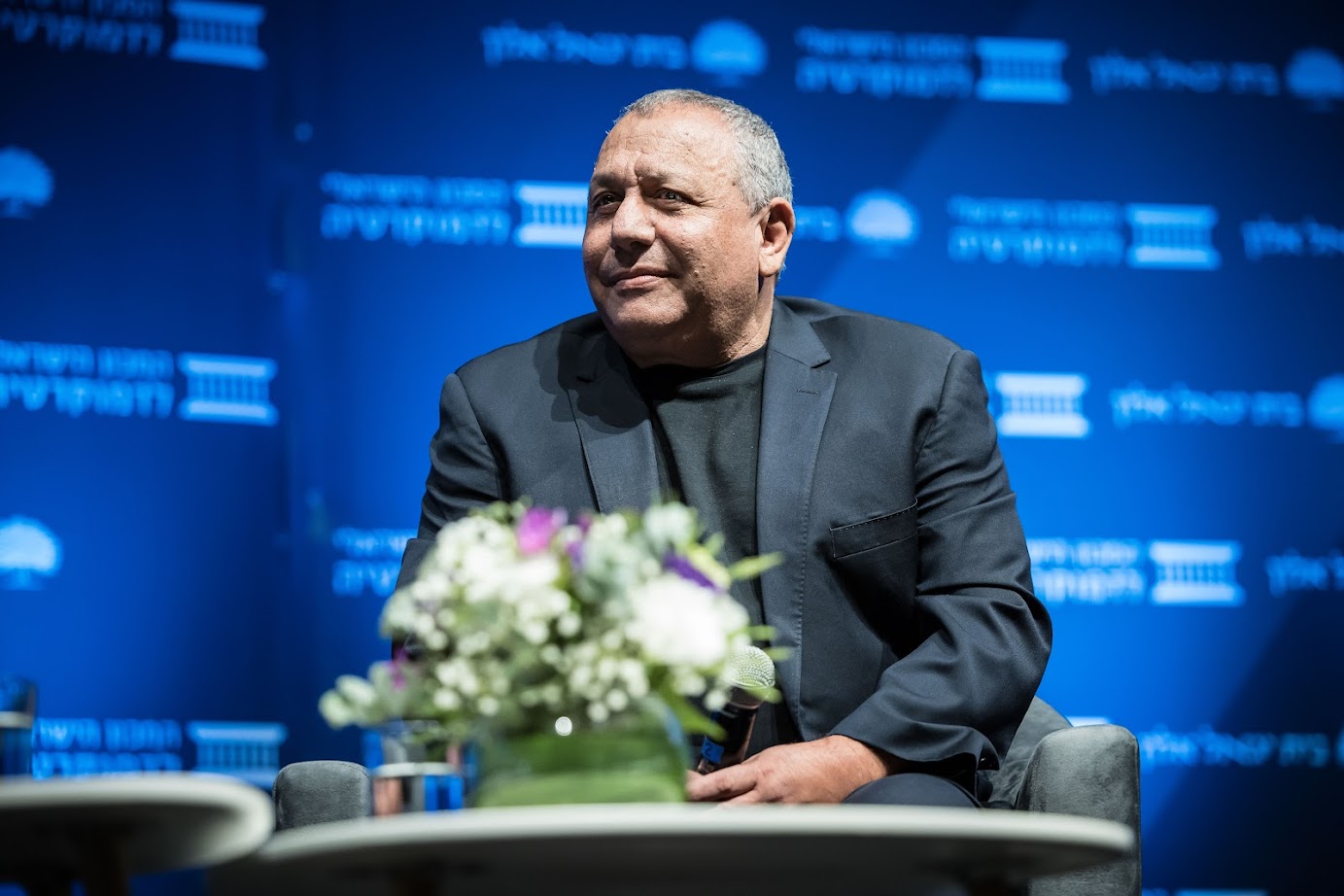
Gadi Eisenkot
Former IDF Chief of Staff Gadi Eisenkot on the agreement being drawn up with Lebanon and the declaration by the leader of the opposition that he will not honor it: “If there is an opportunity to create common ground that will prevent regional deterioration in the future, then taking it is the right thing to do. The statement by the leader of the opposition is a direct challenge to Israeli democracy.”
Eisenkot spoke about the current conditions in the Occupied Territories and the plan being put forward by the National Unity party: “The statements by the head of Yesh Atid about two states for two peoples lack any context in the current reality.”
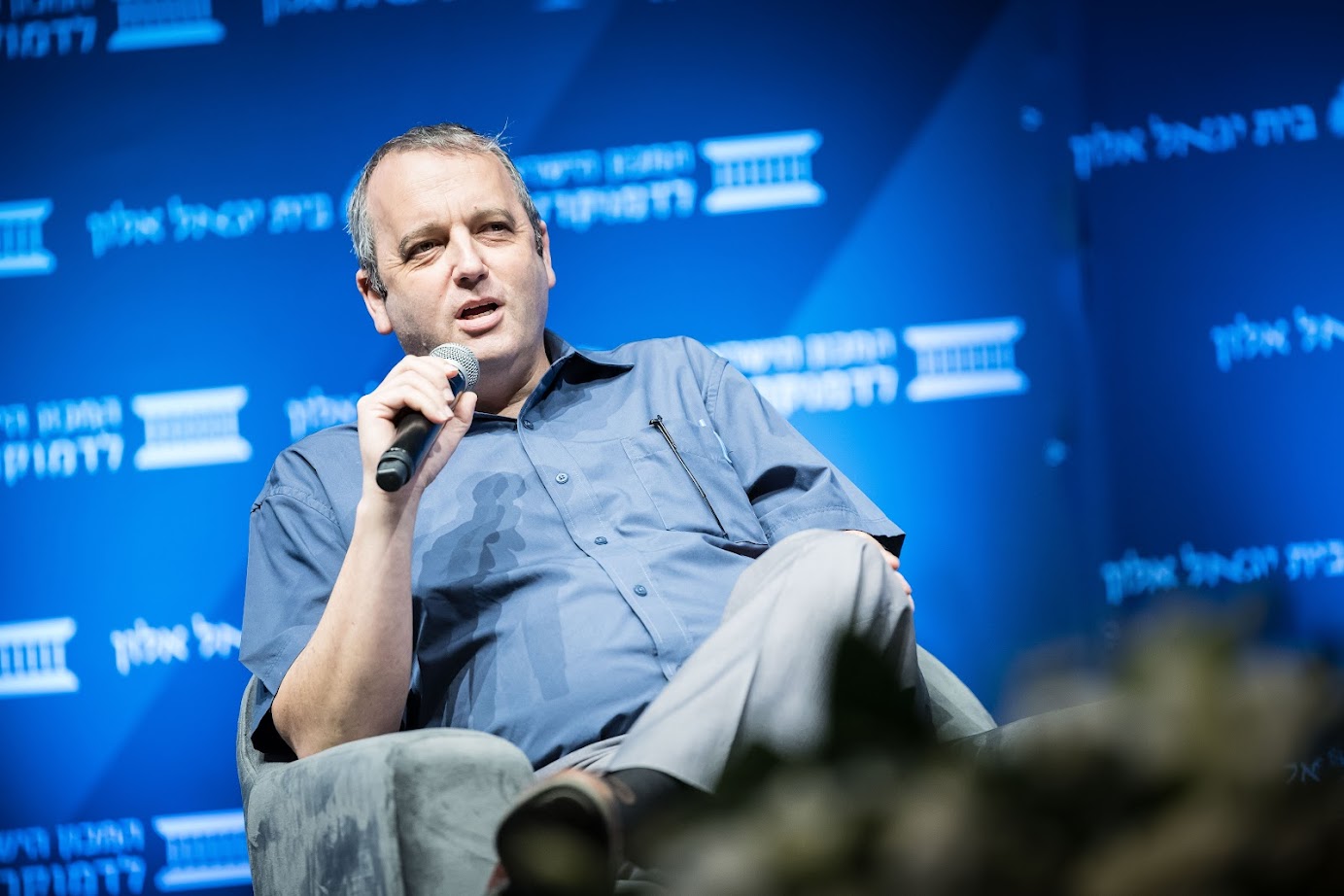
Gilad Kariv
MK Gilad Kariv: “In the current government, Yesh Atid have awarded the right of veto on issues of religion and state. That is over now. The light railway in the greater Tel Aviv area will operate on Shabbat.”
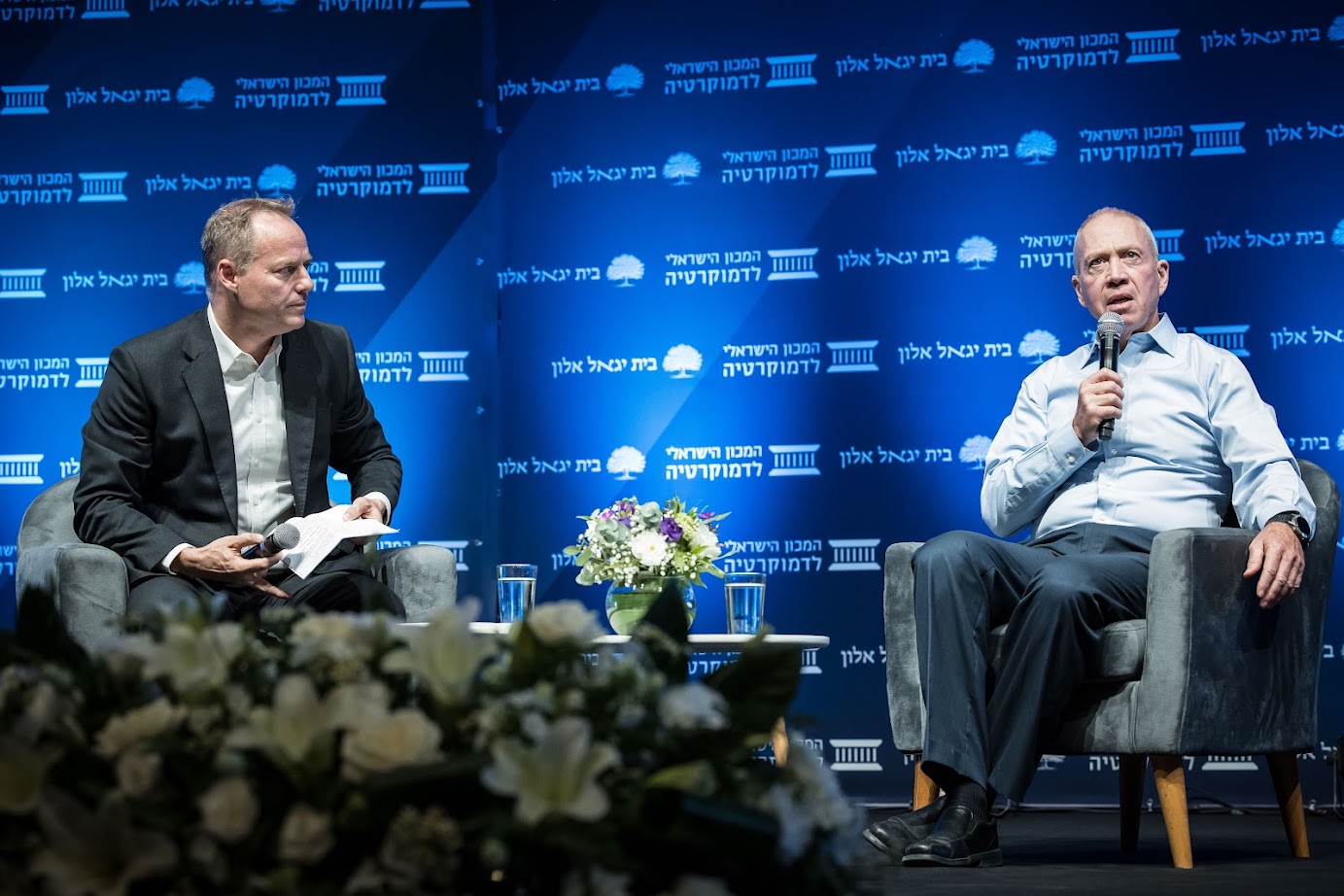
Left to right: Yohanan Plesner, Yoav Gallant
MK Major General (retd.) Yoav Gallant (Likud): “Because there is no permanent civilian and military presence in Northern Samaria, the IDF is there less often. From a military perspective, if you don’t deal with a problem with pruning shears, then at some stage you’ll have to deal with it with a mower; and when a mower is not enough, you’ll have to come back with a bulldozer. There’s a danger that we’ll reach a situation where we’ll have to conquer the territory and rid it of terrorist weeds.”
“During my term as minister of construction and housing, we kept prices under control, we halted the rise [in housing costs]. The biggest profiteer in Israel is the Israel Lands Administration, which is effectively the State of Israel itself. The ILA wants more income; it should be restrained, and its incomes restricted. No-one leaves Israel because of Hamas or Hezbollah, but because they cannot bear the burden of living here, and they can’t buy an apartment. Planned lands are basic goods, and are something that the state should sell cheaply.”
“Why would you replace the attorney general, if she allows the government to whatever it wants, including going against the courts? There is no doubt that the legal system has intruded heavy-handedly into areas beyond its jurisdiction in the last couple of decades. The legal system is a keystone of the state, and it must be returned to its proper boundaries.”
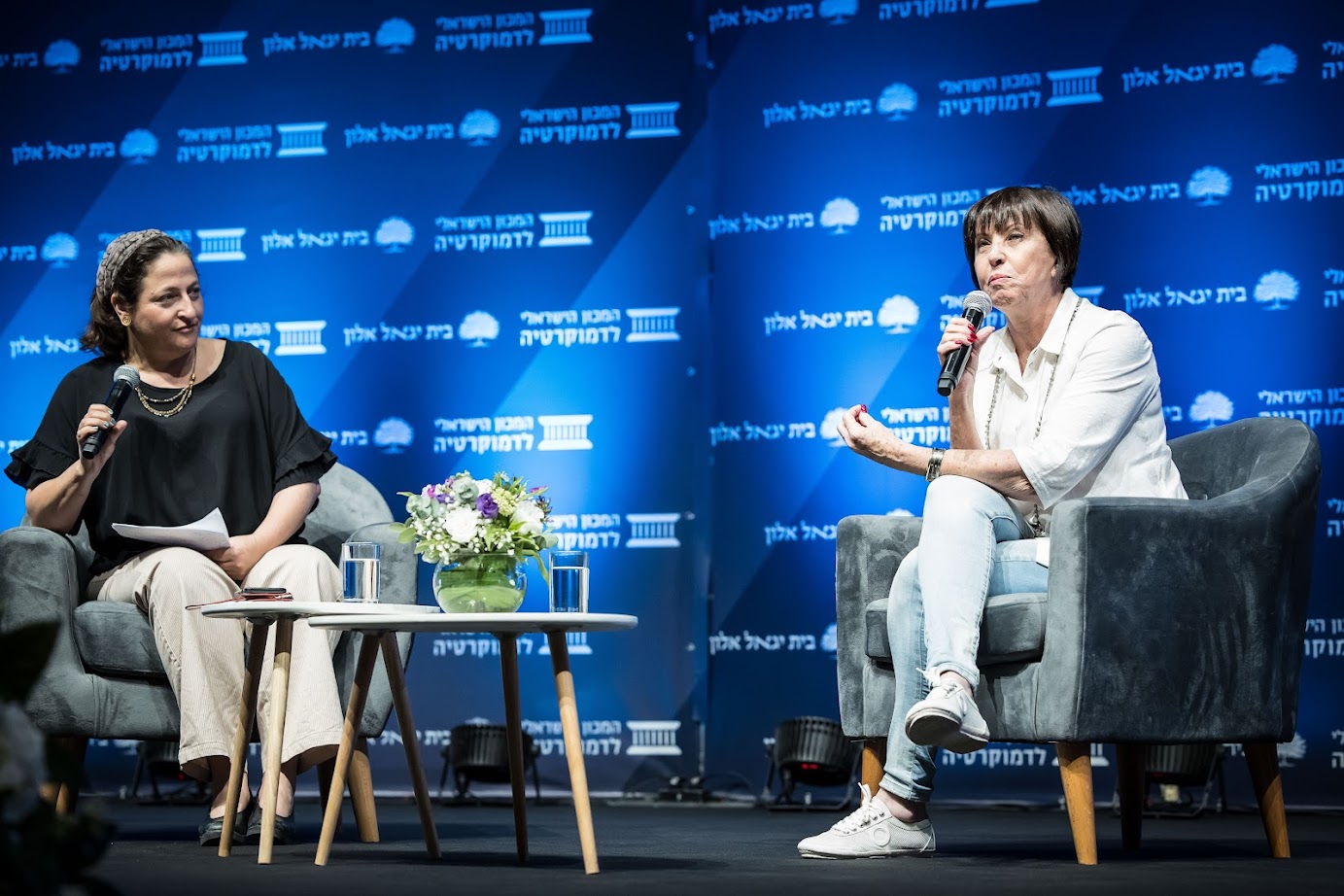
Left to right: Shlomit Ravitsky Tur-Paz , Zehava Galon
Zehava Galon, chair of Meretz: “The vision of two states needs to be turned from a dream into reality, and that depends on courageous leadership on our side. Lapid needs to meet with Abu Mazen not just to put out fires when the situation in the territories deteriorates, but to develop a dialogue with him as a political partner. Millions of Israelis are waiting for positive developments on this front, which will ensure long-term security for Israel.”
“When Gallant says, ‘We’ll go in, we’ll conquer, we’ll pull out.’ What, more blood? What kind of message is he giving our young people? There is a Left here in Israel, a majority of 61 with Meretz, when Meretz is big and strong. Gallant, what have you done as minister of housing for young people here? I support reaching an agreement, ending the occupation, having a just economy. We have a wonderful country. The rise in the cost of living needs to be fought. Not just those who are already well-off should be rewarded. We’ve seen for a long time now that that doesn’t work.”
“When it comes to [seeking to] destroy state institutions, it’s not just those on the margins. Smotrich and Ben Gvir want Jewish superiority. But there are also Arabs in the State of Israel. They’re not just thin air, they’re not going to evaporate. If you don’t want Ben Gvir, then you need to vote for a government of the democratic bloc.”
“I will not rule out the Haredi parties, and will not oppose sitting in government with them. ‘Giving out bribes,’ as it were, to fund institutions that don’t teach the core curriculum—that’s out of the question. I understand that I can’t get everything I want. On issues of religion and state, we will need to preserve the status quo in order to form a government.”

Gilad Kariv
MK Gilad Kariv (Labor), chair of the Knesset Constitution Committee: “There is a clear majority in favor of civil marriage, in favor of public transport on Shabbat, and against the monopoly of the Chief Rabbinate. If there is a market failure in the State of Israel, it’s on this issue. Our political system denies the will of the majority on issues of religion and state, because it gives the Haredi parties a de facto veto. I propose holding a referendum on religion and state.”
“In the current government, unfortunately, Yesh Atid have awarded the right of veto on issues of religion and state. That’s over now. Thus, we promised yesterday—and I'll repeat it today—that the light railway in the greater Tel Aviv area will operate on Shabbat.”
MK Kariv spoke about Shas chairman Aryeh Deri: “In my opinion, someone who has been convicted of criminal offenses and served time in prison, and then broken the law again and been forced to resign from the Knesset, after being indicted again and signing a plea bargain, is not fit for public office.”
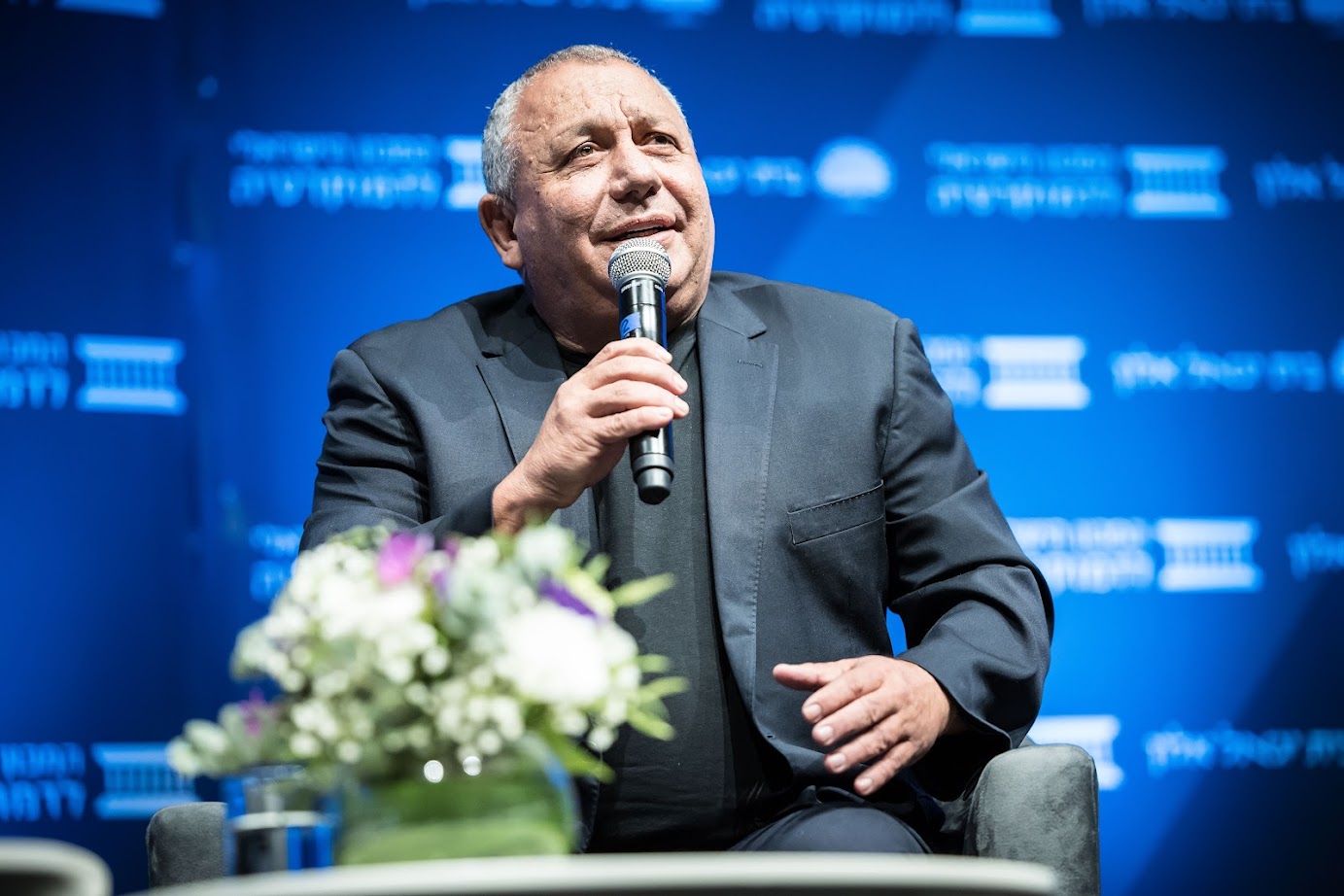
Gadi Eisenkot
Former IDF Chief of Staff Gadi Eisenkot (National Unity) spoke about the agreement being negotiated with Lebanon, and the declaration of the leader of the opposition that he will not honor it:
“This is an unacceptable statement. In our democratic system, there is continuity to governmental decision-making. We need to carefully maintain our sovereignty. But to the fundamental concepts of deterrence, warning, sovereignty, and the ability to win wars, I would also add “equity,” meaning, sharing Israeli knowledge throughout the area in which we live. We need to be very careful about maintaining our sovereignty, but if there is an opportunity to create common ground and collaboration that may prevent regional deterioration in the future, then taking it is the right thing to do. The statement by the leader of the opposition that he will not honor the decision of the current prime minister is extremely dangerous, and represents a challenge to Israeli democracy.”
Eisenkot referred to the current conditions in the Occupied Territories, and to the statement from MK Gallant earlier in the conference about reconquering them:
“Today, the situation is different from how it was during Operation Defensive Shield. The IDF enters Palestinian cities, there is no need to reconquer Judea and Samaria. The talk about revoking the Disengagement Law is fantasy-spinning by elements in the nationalist camp. Recently, the Palestinian Authority has grown significantly weaker and Islamic Jihad has become much stronger. The statements made by the head of Yesh Atid about two states for two peoples lack any context in the current reality. Our proposal is to prevent a binational state, to mitigate the Israeli-Palestinian conflict, and to strengthen the State of Israel as an egalitarian Jewish and democratic state. The way to achieve this is via considered action: in the medium term, closing off the breaches in Judea and Samaria; building up the Palestinian economy in Judea and Samaria in concert with the Gulf states, so that thousands of Palestinians will not enter Israel every day to work; allowing them to bring in funding for hospitals; strengthening the security services; and giving them the opportunity to reach energy independence. The goal of all of this is to foster a situation in which one day, we will have a separate entity living alongside us securely. The condition for that is the power of the IDF, which must be maintained; but in addition to doing so, we also need to try to reduce the conflict and create hope for the two peoples.”
Asked about the words of Shas chairman Aryeh Deri about revoking the designation of “moral turpitude” in his case, Eisenkot said: “As IDF chief of staff I saw Minister Deri for four years in the cabinet. He is a man of intelligence, courage, and insight who has contributed to our national security. At the same time, undermining the legal system damages the proper relation between the three branches of state, and challenges the system of law in the State of Israel. I view this as a blow to the system of law in the State of Israel, a blow to Israeli society. The system of law and its decisions and considerations must be respected, even as we have a responsibility to levy criticism when necessary.”
Regarding his decision to join the National Unity party, he said: “Founding a party is too ambitious, regardless of who I am. I didn’t look at my own position, but rather at where I can contribute to the state. I chose the National Unity party because I understood that it represents the right direction in which the country should be led, in part because of this principle of serving the best interests of the country, which I think is so lacking in our public life. Ultimately, what matters is what is best for the future of the state, and not for the future of a particular individual.”
On the question of legalizing soft drugs, Eisenkot said: “I don’t have a ready response. It needs looking at.”
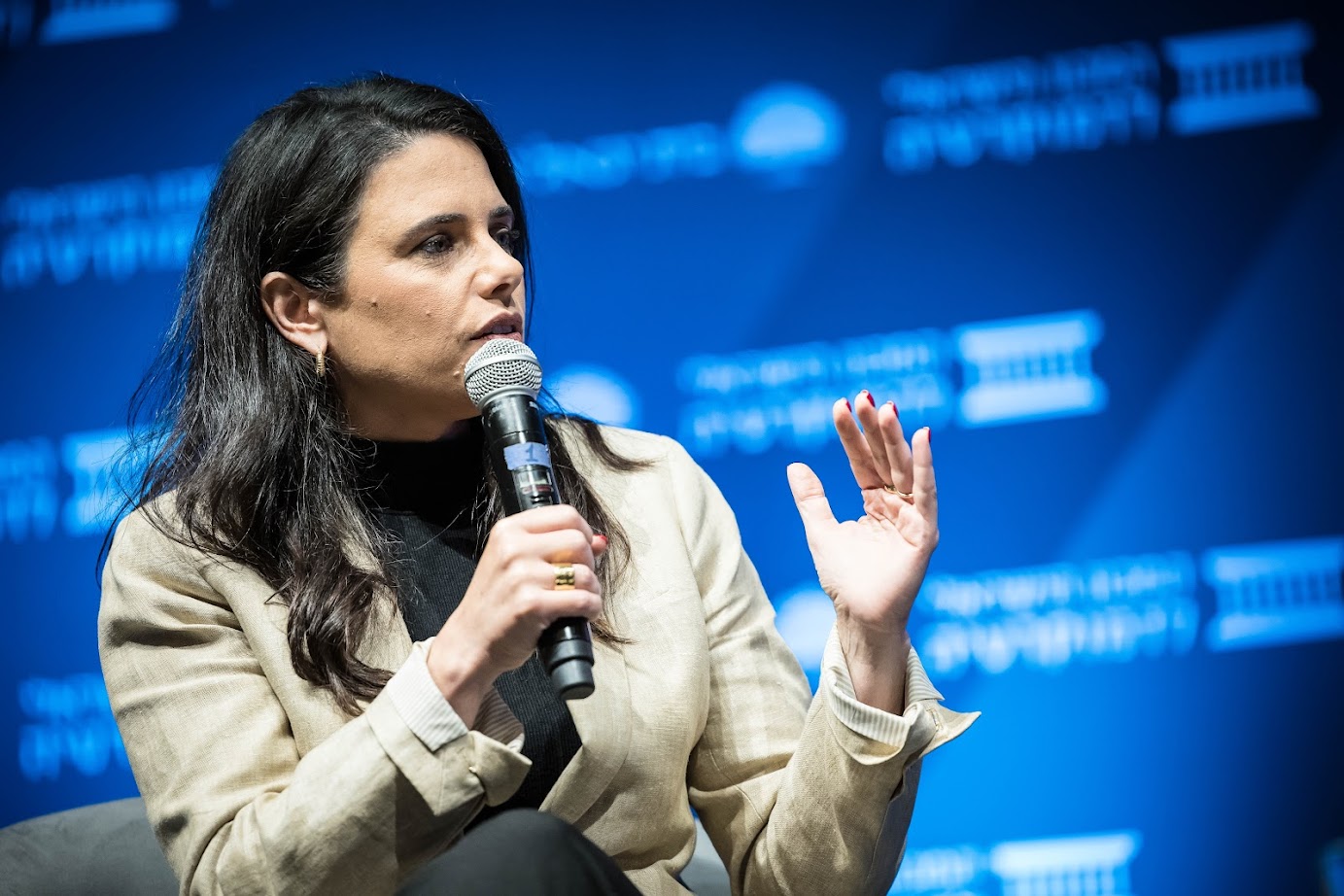
Ayelet Shaked
Minister of the Interior MK Ayelet Shaked (Jewish Home) spoke about the declaration made by the minister of transport that the light railway will operate on Shabbat in the greater Tel Aviv area:
“Public transport on Shabbat is part of the election campaign. Next year, there’ll be a different minister of transport, and who knows what will happen. We support the Gavison-Medan Covenant, but it’s important to sit down and talk. Not just public transport, the light railway is a far-reaching issue.”
On the declarations by Aryeh Deri about the “moral turpitude” designation, she said: “In principle, I’m in favor of repairing the system, not destroying it. I am in favor of the override clause.”
Shaked also referred to the agreement between the leader of the opposition and the Haredi parties about core curriculum studies: “In a right-wing government, it’s important that our voice of sanity be heard. I am absolutely not prepared to award larger budgets to Haredi institutions that don’t teach the core curriculum. On this, we see eye to eye with the Hasidic communities. We must fight for them to be allowed to switch to the Independent Education stream and teach the core curriculum, and also to grow the state-Haredi education system. More and more Haredim want to send their children to state-Haredi schools, and we must ensure that more and more such schools are opened.”
Regarding the security situation in the Occupied Territories, she said: “I was the first to deport families of terrorists, as a deterrent. In Judea and Samaria recently, particularly in Samaria, there has been an increase in the number and sophistication of terror attacks. The Nablus region is ablaze. The Palestinian security apparatus is not managing to gain control of the situation, and it will end in disaster. We need to hold a discussion in the Foreign Affairs and Security Cabinet; I sent a letter to Lapid about two weeks ago demanding that the cabinet meet.” She also said that the Disengagement Law should be revoked, and that she raised this issue almost every week in government, and Netanyahu would take it off the agenda.
Shaked spoke about recommending Netanyahu as prime minister, despite the Likud campaign against her: “I don’t support Netanyahu personally. But he is the head of the largest party in the right-wing camp. There may be room for new leadership, but the Likud has elected him time and time again. Because I am on the Right, I support whoever heads the largest right-wing party.”
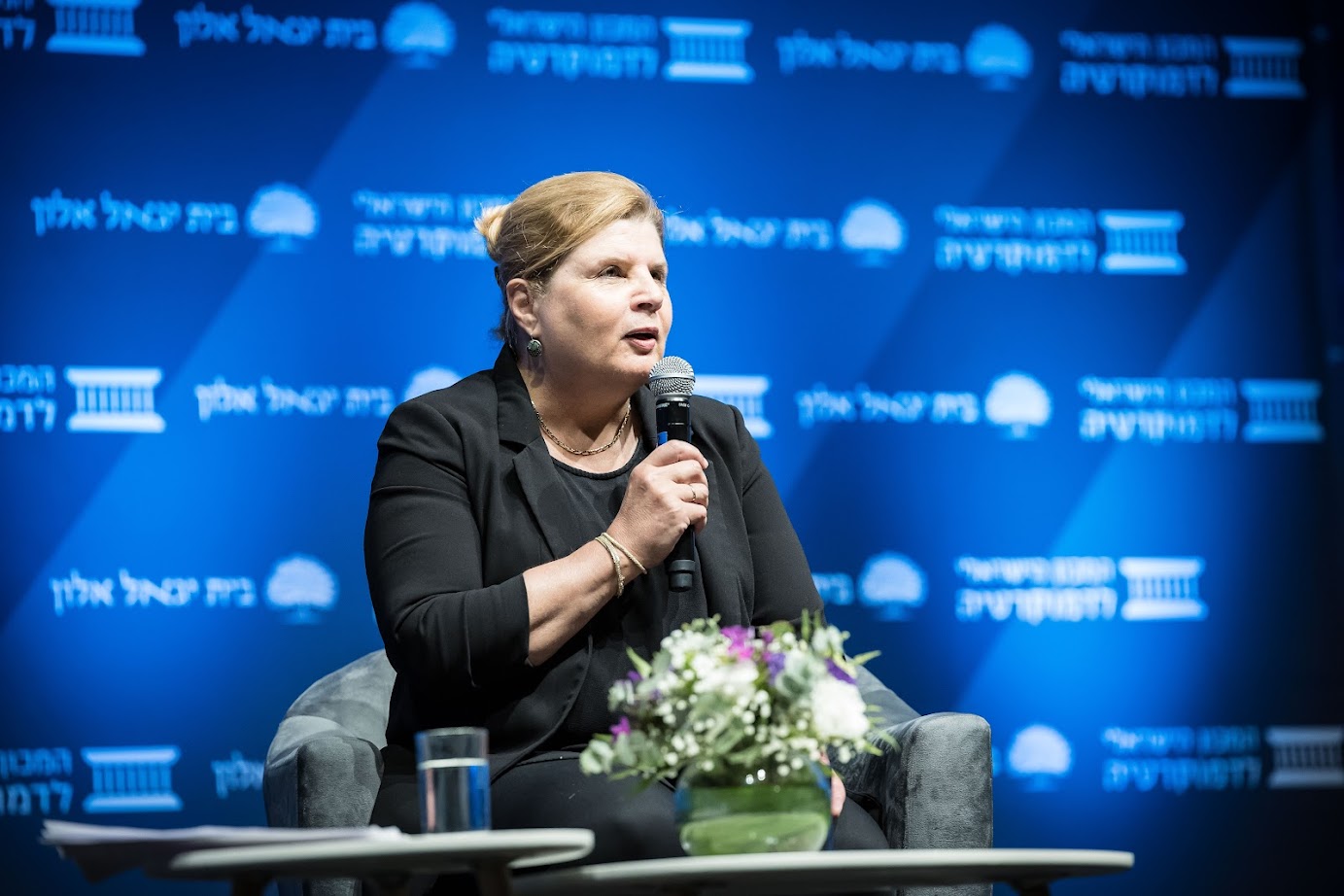
Orna Barbivai
Minister of the Economy Major General (retd.) Orna Barbivai (Yesh Atid): “The high cost of living is troubling. Remember that this is a country that was in stasis for three years, with no workplans approved. The most important thing I noticed at the Ministry of the Economy is that there are barriers. Every product imported to Israel has to be inspected on its way in. So we have removed some of these barriers, and that will certainly lower prices. The more competition there is, the lower the prices. This government has achieved more than was done in recent years.”
On the current situation in Arab society, Barbivai said: “We need to close the gaps in the Arab sector. Don’t think you can simply ignore it; every future government will have to provide responses for it. Mansour Abbas was put to the test during Operation Breaking Dawn. He is a leader with whom we should be cooperating.”
Barbivai called on the participating students to learn about politicians. “When a politician comes along like Ben Gvir, making strong statements, ask yourselves what his background is. Is it morally acceptable for a person indicted of supporting terrorist activity, with eight offenses on his record, and who defended the actions of Yigal Amir, to serve in government in Israel and lead the way? Learn about the people you vote for, and what they have done in the past.”
